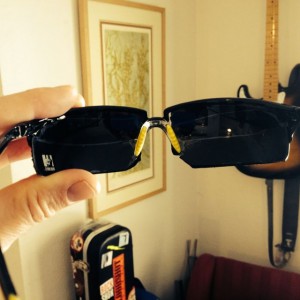By Eric Wilson-Edge
Keith Edgerton is going blind. Doctors told him he’d likely lose all vision by the age of 70. Edgerton and his brother were born with an eye disease called retinitis pigmentosa in which the rods and cones degrade over time. “We lost 60 million to 120 million rods at age three,” says Edgerton.

Edgerton is 44. He is married with two daughters and a stepson. He has a degree in architecture and is an avid outdoorsman. Edgerton works as the Sustainability Coordinator at Providence St. Peter’s Hospital.
We meet at his office. It’s windowless and painted the standard blah color of most hospital interiors. Edgerton does his best to cheer up the place. Nature scenes and pictures of his family adorn the walls.
“The way this disease works is that you end up getting blind spots in your peripheral vision and those blind spots just keep getting bigger,” says Edgerton. Keith is legally blind, has been for almost ten years. “My central vision is great. It’s clear, crisp and has good color.”
Edgerton no longer drives. If he needs to go somewhere he takes the bus or rides his bike. Riding a bike is dangerous even if you have perfect vision. Edgerton acknowledges the difficulty. If he rides to work he takes the same route. Independence and normalcy are important to Keith. He says, “vision is not going to define me.”
Part II
Edgerton didn’t always feel this way. “Becoming legally blind was devastating.” Edgerton prides himself on knowing. He knew in high school that he wanted to be an architect. “This was the first time in my life where I didn’t know.”

Keith hid his disease for years. He’d come up with a quick excuse if he bumped into something or someone. Doubts piled up in his mind. Would he be able to work? Play sports? How would he get around? “I was angry about it and that wasn’t fun,” says Edgerton.
A year after he was declared legally blind Edgerton and wife divorced. They sold their home and Keith moved closer to town. He started to acknowledge his limitations and doing so opened up new opportunities. “I think what happens when you start to accept what you’ve got, whatever life gives you then you can actually figure out how your life’s going to work.”
Part III
In the video Keith slowly veers to the left. He ends up with one foot in the street before he makes a course correction. The cane helps him find his way back. Edgerton is taking part in mobility training through the Washington State Department of Services for the Blind (WDSSB).
Penny Armstrong is a Mobility Specialist with the WDSSB. “It’s my job to help Keith gain as much independence as he can with his vision loss,” says Armstrong, who noted that Edgerton gave her permission to speak about his case.
This means grabbing a cane and a pair of occluded sunglasses and going out into the world. “He has no vision when he puts those glasses on,” says Armstrong. “He has to start relying on his other senses including information that’s transferred from the tip of the cane to the grip of the cane.”
Edgerton’s sessions are one to two hours long. They range from relatively easy tasks like crossing a street in a quiet neighborhood to navigating the busiest intersections in town. Armstrong acts as a coach. She helps Keith analyze his environment. “One of the first things we do is stand on the corner and just listen to traffic,” says Armstrong.

Listening provides several clues including which lanes of traffic are moving and how fast they’re going. Subtle dips in the payment can be felt by the cane and by muscles in the hand. “Mobility training is intense but I look forward to it,” says Edgerton. “I’m more mobile, more independent. It’s taken away the fear.”
Part IV
Edgerton is remarried. His daughters know what’s happening but they don’t seem worried. “We still live the same life but it takes more planning and forethought,” says Edgerton.
Keith has embraced help from friends and family, something he used to avoid. He now understands that helping is just something you do when you care. “Going through this has really forced me to enjoy life,” says Edgerton. “It’s humbled me, made me more compassionate. I have a lot more space for people going through their own stuff.”
Edgerton has also found an outlet. He started his own blog. In it, he chronicles his experience with retinitis pigmentosa. The posts are cathartic and helpful. They’re a life preserver for anyone who is struggling to stay afloat. “I really think that most people rise to the occasion,” says Edgerton.
Keith Edgerton is going blind. I think he’s seeing pretty clearly.





















































